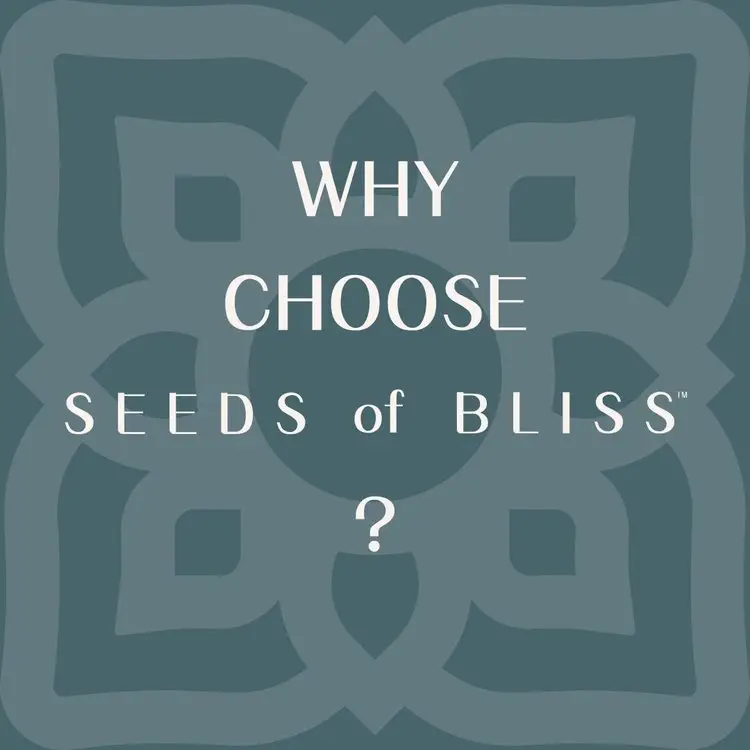Our Philosophy

Our motto, “Bridging the Everyday with the Eternal,” encapsulates our dedication to merging seemingly different or opposite concepts to create a balanced, harmonious existence. At SEEDS of BLISS™, we love building bridges and bringing together diverse ideas, including:
Body with Soul: Integrating physical wellness with spiritual growth.
Mind with Feelings: Harmonizing intellectual clarity with emotional depth.
Masculine with Feminine: Balancing dynamic action with receptive intuition.
Social Gaps with Inclusion & Accessibility: Creating a community where everyone feels welcome and valued.
The Seen with the Unseen: Connecting tangible realities with spiritual truths.
Power with Consciousness: Empowering individuals with mindful awareness.
Grounding with Spirituality: Rooting spiritual insights in everyday practices.
Fear with Love: Transforming fear through the power of love.
Evolution with Involution: Encouraging external growth and internal reflection.
The Self with the Dharma: Aligning personal goals with higher purposes.
Humanity with Enlightenment: Fostering a global community striving for collective enlightenment.
Our Trauma Informed Approach
Our trauma-informed approach within SEEDS of BLISS™ focuses on creating a safe, supportive, and empowering environment for individuals who have experienced trauma. This approach recognizes the widespread impact of trauma and understands potential paths for recovery. It emphasizes physical, psychological, and emotional safety for both providers and participants, fostering a sense of belonging and trust.
Here is a more detailed description of a trauma-informed approach for SEEDS of BLISS™:
1. Safety and Trustworthiness
-
Creating a Safe Environment: Ensuring that all participants feel physically and emotionally safe through clear communication about expectations and consistent routines.
-
Building Trust: Establishing trust by being transparent about what to expect, maintaining confidentiality, and consistently following through on promises.
2. Empowerment, Voice, and Choice
-
Empowering Participants: Providing opportunities for participants to make choices and have a say in their healing process. Offering multiple ways to engage with programs and being flexible to meet their needs.
-
Encouraging Self-Advocacy: Encouraging participants to express their needs, boundaries, and preferences and supporting them in being active agents in their healing journey.
3. Collaboration and Mutuality
-
Collaborative Decision-Making: Working together with participants to create an environment that promotes healing. This means valuing their input and recognizing them as partners in the process.
-
Building Mutual Respect: Creating a culture where staff and participants respect each other’s experiences, perspectives, and contributions.
4. Understanding Trauma and its Impact
-
Training and Education: Ensuring that all staff are educated about trauma, its effects, and how it may manifest in different behaviors. This includes ongoing training on trauma-informed care principles and practices.
-
Recognizing Triggers: Identifying potential triggers for participants and working to minimize these, creating a more supportive environment.
5. Cultural, Historical, and Gender Sensitivity
-
Cultural Awareness: Acknowledging and respecting the cultural, historical, and gender contexts of participants. This means being aware of how these factors can influence a person’s experience of trauma and recovery.
-
Inclusive Practices: Ensuring that services are inclusive and accessible to all individuals, regardless of their background, identity, or circumstances.
6. Promoting Resilience and Recovery
-
Focus on Strengths: Emphasizing participants’ strengths and abilities rather than their deficits in order to build resilience and a sense of agency.
-
Supporting Recovery: Offering a range of services and supports that promote healing and recovery, tailored to the unique needs of each participant.
7. Providing Peer Support
-
Peer Support Networks: Facilitating peer support opportunities where individuals can share experiences, offer mutual support, and build a sense of community.
-
Role of Lived Experience: Incorporating individuals with lived experience of trauma into the support and recovery process as mentors or peer supporters.
8. Ongoing Reflection and Adaptation
-
Continuous Feedback Loop: Gathering regular feedback from participants and staff to continuously improve and adapt the approach to be more responsive to participants’ needs.
-
Commitment to Growth: Being committed to ongoing learning and development in trauma-informed practices and maintaining flexibility to adapt as needed.
In practice, a trauma-informed approach at SEEDS of BLISS™ involves using consistent and predictable routines, and providing multiple forms of communication for feedback. Staff are trained to recognize signs of trauma and respond in ways that prioritize safety and empowerment. Additionally, our personal development programs and workshops are designed to allow for flexibility, inclusivity, and collaboration, ensuring that every participant feels valued and heard.
By integrating these principles into all aspects of its operations, SEEDS of BLISS™ create a nurturing environment that not only supports healing but also fosters growth, resilience, and a sense of community among all participants.

